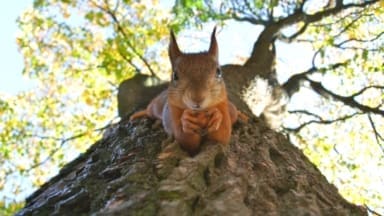
Sadly red squirrels are now an endangered species and it is estimated that without action red squirrels will become extinct in England within a decade. The Westmorland Red Squirrel Society is a registered charity, working to making the future safe for Westmorland’s Red Squirrels.
Most know that the non-native grey squirrel, first introduced to England from America in the late 1870s, and has spread across the UK, causing the devastation of the UK red squirrel population. Greys compete for food and habitat with the red, but its the interaction with the grey squirrel that represents the most serious and urgent threat to our red squirrel population.
The squirrel pox virus (SQPV) which is fatal when passed to red squirrels was first recorded in Cumbria in Spring 1998. Grey squirrels have developed immunity to the disease and are carriers of the infection. The mortality rate for untreated infected red squirrels in the wild appears to be 100%, most dying within 15 days of being infected.
The virus can spread through contact with the infected lesions or contaminated crusts. Most pox viruses are highly resistant to drying, which allows crusts to remain infectious for long periods of time. It is believed that the virus may be transferred by feeders, traps or any other equipment used in areas occupied by squirrels which is why red squirrel preservation organisations recommend that all equipment is disinfected regularly.
Bird feeder hygiene is also key for birds, to avoid parasitic diseases and bacterial infections such as Trichomonosis (passed from bird to bird via saliva), Avian flue (contact contaminated saliva and droppings) and Salmonella (rotting food and droppings of infected birds contaminating food and water) wherever birds feed intensively.
Helping wildlife is commendable, but for all those using bird feeders be aware of the hygiene requirements. Similarly, for those trading in bird feeders it’s vital to make customers aware of the threat of unhygienic feeders to birds as well as endangered red squirrels.

